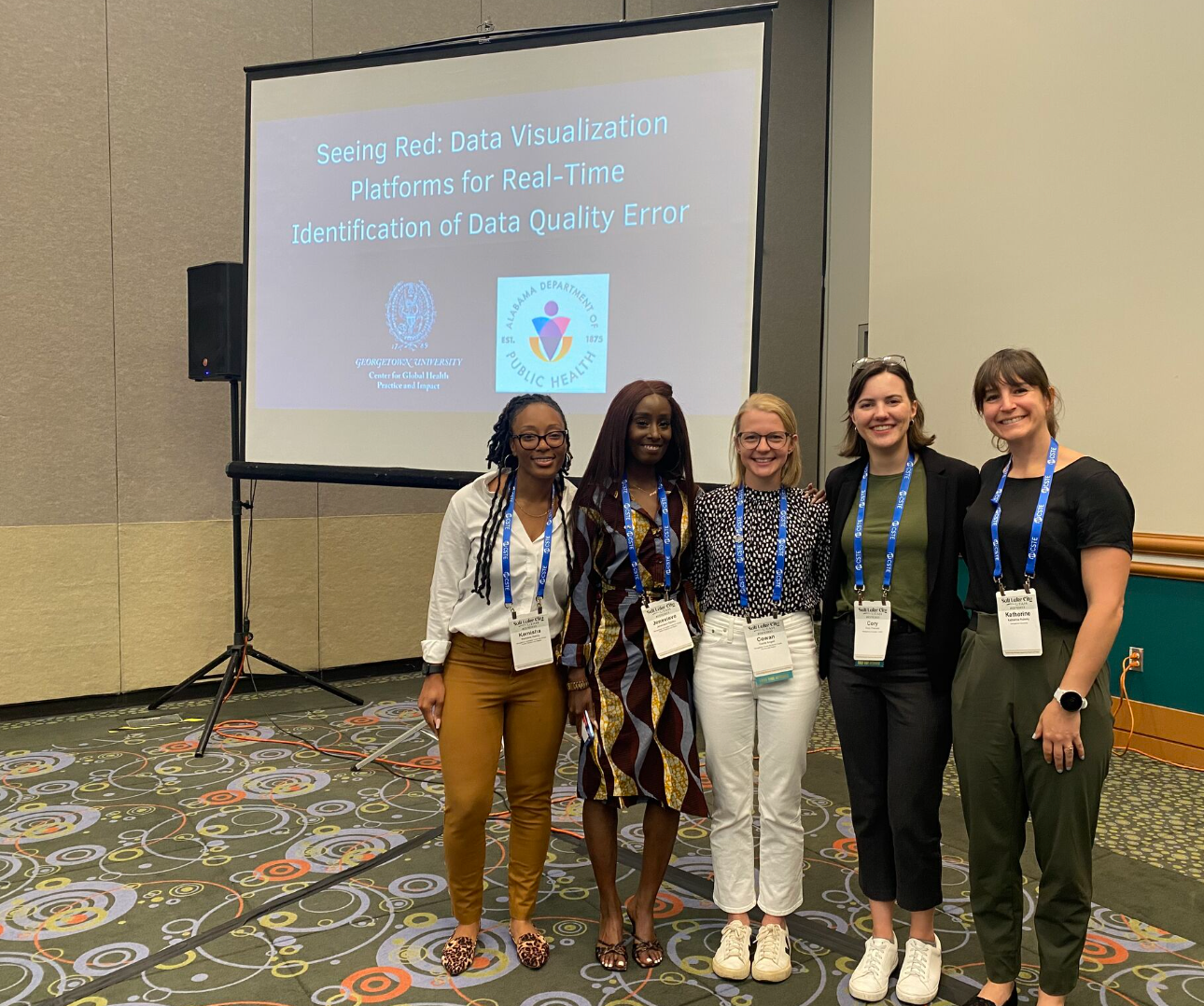As of 2019, the HIV antiretroviral treatment (ART) adherence rate among estimated 206,000 people living with HIV (PLHIV) in the United States was 74% (and ranged between 73% – 76% while the median ranged between 80% – 87%). Adherence to ART is crucial to PLHIV as it involves beginning treatment, attending medical appointments, and taking the prescribed medicine according to recommended guidelines to stay healthy. With the importance of continuing HIV care, Georgetown University’s Center for Global Health Practice and Impact (CGHPI) has been working since 2019 with the Health Resources and Services Administration (HRSA) under the U.S. Department of Health and Human Services (HHS) on a project focusing on Improving Ryan White Outcomes Using a Tiered Technical System Approach to HIV-STI Data Linkages in four jurisdictions of Alabama, Florida, Louisiana, and Washington D.C. to improve the application of HIV-STI data to enhance health outcomes of PLHIV.
The project’s goal has been to improve data linkage between HIV and Sexually Transmitted Infections (STI) surveillance systems at the state health departments and data collected through the Ryan White HIV/AIDS Program (RWHAP) to identify gaps in health outcomes. The project has supported health departments to develop, implement, and institutionalize proven strategies to link and re-engage PLHIV into care.
The project has focused on the provision of key tools, such as data linkage protocols, data sharing policies, business development processes, structured communication, and collaboration for participating jurisdictions.
Each jurisdiction received tailored technical assistance informed by a baseline comprehensive needs assessment conducted at the beginning of the project. For Florida, automated and concentrated HIV-STD data warehouses were developed, external systems and processes were coordinated, and strategic data-sharing training at six independent county-level programs was organized. The Alabama team developed a warehouse to integrate HIV and STI data and developed an internal dashboard to inform prevention and patient outreach efforts. Additionally, a structured collaborative working approach was instituted among the Alabama Department of Public Health (ADPH), RWHAP, and HIV care providers from different counties. Washington D.C. integrated their HIV and STI data into one data system, developed business process documentation for the integration process, established routines for data sharing between surveillance and care administrations, and enhanced the coordination between departments for data-to-care (D2C) activities. For Louisiana, HIV data were integrated into current STD programs, departmental data processes were formalized, and care data has become more accessible through the program care outreach system. In addition, the project facilitated benchmarking and best practice adoption between jurisdictions, and this resulted in the uptake of Florida data solutions in Louisiana to improve the State’s data-to-care activities for HIV services provided.
Since the HRSA project began at the peak of the COVID-19 pandemic, challenges involving recruiting states to participate, travel mandate, and high staff turnover rate within health departments caused delays in producing the deliverable outcomes. However, the team overcame these challenges through more effective communication strategies leveraging a virtual communication platform through Zoom. Most importantly, the project established Communities of Practice (CoP) for staff across all four jurisdictions working on the same issues to optimize collaboration and enhance the fast adoption of best practices. The CoP created a network of support, expanded resources, and created a community to rely on despite the challenges brought by COVID-19 restrictions.
This project has raised data literacy levels across the board – for staff from both our Center and health departments in the four jurisdictions. Additionally, structured data use and collaborative processes informed by tailoring specific data provided actionable decisions and data ownership. Data analysis was learned by those who collected and used the data, which helped with data collection. Additionally, approaches to improve data reporting became the next priority. “This proved that once structured data use is incentivized, data use can be routinized within any organization”.
Collaborative work between health departments and CGHPI conveyed the significant roles of data and dissemination in HIV-STI projects. This HRSA project made positive impacts by improving the application of HIV-STI data to link and re-engage PLHIV to care for better health outcomes. For future endeavors in HIV-STI projects, it will be crucial to ensure that state-level data reaches local organizations for higher data quality, establish routine data-sharing practices among different entities at the health department with HIV data, measure system integration progress, and enhance relationships to support data integration efforts. Most importantly, data-related interventions must be informed by the people who currently use the data. This will require the co-creation and co-implementation of such interventions. This is what we have tried to accomplish throughout the process of implementing this project. We hope those lessons learned will inform future initiatives.
Author: Ms. Saie Kim
